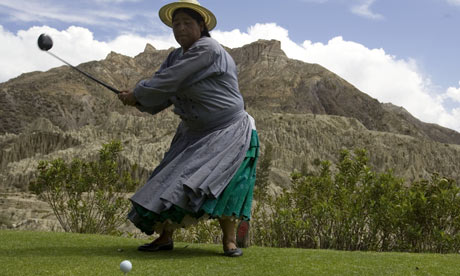
(above) Marta Mamani, an Aymara indigenous woman, hits a drive during her work break at La Paz Golf Club, Bolivia, Photograph: Joao Padua
Fairway freedom: golf cholitas bridge Bolivia's class gap
April 20, 2009 - The Guardian
Perched in the Andes at 3,300 metres above sea level, it is the world's highest golf club and boasts stunning views of snow-capped mountains.
But the most remarkable sight on the fairways of La Paz golf club is four indigenous women in bowler hats, shawls and layered skirts who tee-up and swing their own rusty clubs.
They are "cholitas", traditionally dressed Aymara women who occupy the lowest social rung in Bolivia. The foursome who regularly play 18 holes are groundskeepers at the club and have been taught to play the game to better understand how to maintain greens and fairways. "It is a very pretty game, I love it," said Marta Mamani.
The golfing cholitas are all the more incongruous because the club is a citadel of privilege amid a tumultuous "democratic revolution", which has pitted impoverished, indigenous Bolivians against wealthy, pale-skinned elites.
President Evo Morales, a former llama herder, has vowed to reverse centuries of discrimination by the descendants of European settlers against the indigenous majority.
The government's campaign has encountered fierce and sometimes violent resistance from middle and upper class Bolivians who accuse the South American nation's first indigenous head of state of being a socialist despot.
Such polarisation has made things awkward for the club and the cholitas have created a rare bridge between two social divides, making the women minor celebrities in La Paz. "The members don't have any problem with them playing but they don't want any more publicity," said Susana Arinez, the club's general manager.
The cholitas, who started playing about six years ago, practise on Mondays when the club is closed for maintenance. "I don't play as much as I used to, maybe just once every few weeks," said Mamani.
Her ageing irons, tied with an elastic band, were a present from a club member and her balls, carried in a plastic bag, are ones she found in the rough. She earns $129 (£87) a month, well above the minimum wage of $82.
The club, founded in 1912 by migrant British railroad workers, charges a $4,000 entry fee and $100 monthly subscription - large sums in one of the continent's poorest countries.